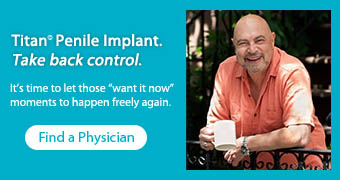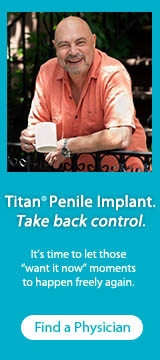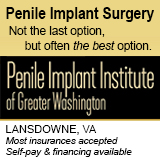I joined this community in January 2023. After receiving my Coloplast Titan Implant in 2022, one thing has consistently troubled me: the questions I get about my satisfaction with the implant. Each time I visit my urologist, I am given simplistic questionnaires that ask if I am satisfied with my ability to have an erection sufficient for intercourse. And each time, I mark up the forms, commenting that the question is far too narrow to capture my real feelings.
You would think after repeatedly crossing out these questions, my doctor might stop and ask why. But no. He never does. If these types of surveys are the primary tools for measuring patient satisfaction, it is no wonder satisfaction rates are high. I answer "yes" to the basic question because it is the only one, I am given and, technically, it is true. I can pump it up and have an erection whenever I need one. But that is just scratching the surface.
I do not blame my doctor personally for this, but it speaks of a larger issue in how society and the healthcare system view men's sexual health. In my experience, urologists often approach men with a simplistic mindset: "Get him hard again, and he’ll be happy." They cannot restore natural erections, but they can offer a prosthesis that mimics one.
However, this level of satisfaction would not be expected for any other kind of prosthesis—whether it is for a nose, an ear, a hand, or a foot. Research bears this out. There is nowhere near the same satisfaction rates for those prostheses as there are for penile implants. This raises concerns about the design of these satisfaction surveys. Men are human beings with complex feelings, and it seems perfectly natural to feel conflicted about needing a prosthesis for such an intimate function. But when it comes to penile implants, there seems to be an unrealistic expectation that we will all be thrilled with the result.
What really struck me recently was an article in the Oxford Academic Journal titled Managing the Difficult Penile Prosthesis Patient. It explained that the small percentage of patients who are dissatisfied despite “acceptable surgical results” are often labeled with the acronym CURSED—standing for Compulsive/obsessive, Unrealistic, Revision, Surgeon Shopping, Entitled, Denial, and Psychiatric. When I read this, I thought, "Wow, talk about shaming patients into silence." Who would feel comfortable being honest about their dissatisfaction if doing so risks being dismissed as "CURSED"?
This reminds me of something Nietzsche said about group criticism—he called it a manifestation of the "herd mentality." In this view, people conform to common values and suppress those who deviate from the norm, not to promote individual growth but to maintain mediocrity and safety. Some men may have a perfectly reasonable psychological and emotional reaction to a prosthesis, but their concerns are often sidelined.
I have been reading posts here for a while now, and I am constantly impressed by the courage many of you show in sharing your stories, both of success and vulnerability. However, I have also noticed (though not always—there are many empathetic members here) that when someone expresses dissatisfaction, they are sometimes told, “Be happy you can still have an erection,” as if that alone should soothe us. We know we are much more complicated than that.
In my own experience, I went through what I believe is the typical path for a 48-year-old prostate cancer patient at the time: normal sexual function, followed by a radical prostatectomy, which led to erectile dysfunction. I tried ED pills and injections, but eventually, neither worked. After a period of complete impotence, I chose to get a penile implant. Alongside this physical journey were significant challenges in my personal life—relationship struggles and breakups linked to erectile dysfunction, as well as battles with depression, anxiety, therapy, and sexual counseling. I'm still standing, but not without physical and emotional scars, along with lingering reservations.
It's a mixed experience for me. Some days, I’m thrilled that I can enjoy penetrative sex again. I work out 3 to 5 days a week, my endurance is great, and I can engage in long sessions without getting winded. On those days, I feel good about the functionality. But other days, I really dislike the way my penis looks. It has an odd, flat, oval shape, with an indentation running down the middle of the shaft that makes the tubing on both sides more noticeable. There's little to no blood flow, no natural tumescence, and the head of my penis remains small and doesn’t engorge. I use gels, vacuum erection pumps, and rings to trap blood, but honestly, it often ends up being painful. Many times, I have sex while dealing with discomfort or pain, which only adds to the frustration. After seeing multiple doctors, all of them have basically told me, “It is what it is,” and there’s not much more they can do.
Then there's the issue of anorgasmia. My sensitivity has decreased to the point where achieving orgasm has become incredibly rare. I’ve tried medications without success. I don’t take anything that would interfere with my ability to orgasm, but no matter how much I pump or attempt manual stimulation, I’m lucky if I can orgasm 1 out of 10-15 times. Whether it’s through intercourse or other forms of stimulation, it’s just not happening. I’ve seen excellent sex therapists and tried all kinds of approaches, but this is where I am now.
So, to put it plainly: Yes, I’m glad I got the implant. Yes, I love that I can have intercourse again and no longer have to worry about impotence. But at the same time, I struggle with accepting the prosthesis. I have issues with my body image, with how my penis looks, with depression and anxiety, and with the frustration of not being able to release my sexual energy through orgasm. I understand that sex is about more than just orgasms—it’s also about intimacy—and I show up for that. I don’t shy away from life, relationships, or sex.
I’m sharing this to emphasize that it’s complicated. We all know that. It doesn’t have to be all sunshine and rainbows, nor does it have to be darkness and gloom. For me, sometimes it’s both, and sometimes it’s neither. There are days when I don’t even think about it. And there are some days it's all I can think about. But I’ll admit, since prostate cancer, I think about my penis way more than I used to.
I want to encourage other men to be open, honest, and vulnerable about their low points, if they have them, without feeling labeled or CURSED. I’ve found that the high moments can balance out the lows, and making space for both feels like the most human thing to do.
Men's experiences with penile implants are multifaceted, and it's time the healthcare system acknowledges the emotional and psychological complexities that come with this journey. It is not just about functionality; it is about feeling heard and understood.
Thanks for Reading
Peace
How I Feel After Two Years
How I Feel After Two Years
62 years old. Radical prostatectomy in 2008. ED medicine and injections all failed eventually.
23cm Coloplast Titan implant in 2022.
TRT
L: 7.7 G: 6.00 (fully inflated)
L: 8.1 G: 6.20 (fully inflated w/VED + Trimix Gel)
L: 6.5 G: 5.0 (fully deflated)
23cm Coloplast Titan implant in 2022.
TRT
L: 7.7 G: 6.00 (fully inflated)
L: 8.1 G: 6.20 (fully inflated w/VED + Trimix Gel)
L: 6.5 G: 5.0 (fully deflated)
- happycamper59
- Posts: 197
- Joined: Tue Aug 01, 2017 11:02 pm
Re: How I Feel After Two Years
Spot on, lalo. And amen, brother.
ED worsened over 25 years, likely VL. Went through pills and injections, and results faded over time. Implant AMS 700CX, 21 cm, no RTE, on 6/3/24.
Re: How I Feel After Two Years
What a tremendous post. But you said it at the end there: "functionality." This is how men are viewed by society: women are built for form; men are built for function. The implant is no exception; the cosmetic aspect is always secondary, or even tertiary, to function. "Well, you can get an erection, right?"
There's a poster here, niceguy1, who went from an inflatable to a malleable, and says that the malleable not only feels better than the IPP (which when inflated presses against the tissue from the inside), but that he even gets better engorgement with it due to the lesser restriction.
Just food for thought.
There's a poster here, niceguy1, who went from an inflatable to a malleable, and says that the malleable not only feels better than the IPP (which when inflated presses against the tissue from the inside), but that he even gets better engorgement with it due to the lesser restriction.
Just food for thought.
40. Implanted July 5, 2024, by Dr. Andrew Kramer, Urology Associates of Cape Cod. AMS LGX, 21cm cylinders + 2cm RTEs. Idiopathic "hard flaccid" ED following bacterial infection. Tried pulse waves, Cialis, TRT, even spinal injections. Nada.
Re: How I Feel After Two Years
Lalo6000 wrote:I joined this community in January 2023. After receiving my Coloplast Titan Implant in 2022, one thing has consistently troubled me: the questions I get about my satisfaction with the implant. Each time I visit my urologist, I am given simplistic questionnaires that ask if I am satisfied with my ability to have an erection sufficient for intercourse. And each time, I mark up the forms, commenting that the question is far too narrow to capture my real feelings.
You would think after repeatedly crossing out these questions, my doctor might stop and ask why. But no. He never does. If these types of surveys are the primary tools for measuring patient satisfaction, it is no wonder satisfaction rates are high. I answer "yes" to the basic question because it is the only one, I am given and, technically, it is true. I can pump it up and have an erection whenever I need one. But that is just scratching the surface.
I do not blame my doctor personally for this, but it speaks of a larger issue in how society and the healthcare system view men's sexual health. In my experience, urologists often approach men with a simplistic mindset: "Get him hard again, and he’ll be happy." They cannot restore natural erections, but they can offer a prosthesis that mimics one.
However, this level of satisfaction would not be expected for any other kind of prosthesis—whether it is for a nose, an ear, a hand, or a foot. Research bears this out. There is nowhere near the same satisfaction rates for those prostheses as there are for penile implants. This raises concerns about the design of these satisfaction surveys. Men are human beings with complex feelings, and it seems perfectly natural to feel conflicted about needing a prosthesis for such an intimate function. But when it comes to penile implants, there seems to be an unrealistic expectation that we will all be thrilled with the result.
What really struck me recently was an article in the Oxford Academic Journal titled Managing the Difficult Penile Prosthesis Patient. It explained that the small percentage of patients who are dissatisfied despite “acceptable surgical results” are often labeled with the acronym CURSED—standing for Compulsive/obsessive, Unrealistic, Revision, Surgeon Shopping, Entitled, Denial, and Psychiatric. When I read this, I thought, "Wow, talk about shaming patients into silence." Who would feel comfortable being honest about their dissatisfaction if doing so risks being dismissed as "CURSED"?
This reminds me of something Nietzsche said about group criticism—he called it a manifestation of the "herd mentality." In this view, people conform to common values and suppress those who deviate from the norm, not to promote individual growth but to maintain mediocrity and safety. Some men may have a perfectly reasonable psychological and emotional reaction to a prosthesis, but their concerns are often sidelined.
I have been reading posts here for a while now, and I am constantly impressed by the courage many of you show in sharing your stories, both of success and vulnerability. However, I have also noticed (though not always—there are many empathetic members here) that when someone expresses dissatisfaction, they are sometimes told, “Be happy you can still have an erection,” as if that alone should soothe us. We know we are much more complicated than that.
In my own experience, I went through what I believe is the typical path for a 48-year-old prostate cancer patient at the time: normal sexual function, followed by a radical prostatectomy, which led to erectile dysfunction. I tried ED pills and injections, but eventually, neither worked. After a period of complete impotence, I chose to get a penile implant. Alongside this physical journey were significant challenges in my personal life—relationship struggles and breakups linked to erectile dysfunction, as well as battles with depression, anxiety, therapy, and sexual counseling. I'm still standing, but not without physical and emotional scars, along with lingering reservations.
It's a mixed experience for me. Some days, I’m thrilled that I can enjoy penetrative sex again. I work out 3 to 5 days a week, my endurance is great, and I can engage in long sessions without getting winded. On those days, I feel good about the functionality. But other days, I really dislike the way my penis looks. It has an odd, flat, oval shape, with an indentation running down the middle of the shaft that makes the tubing on both sides more noticeable. There's little to no blood flow, no natural tumescence, and the head of my penis remains small and doesn’t engorge. I use gels, vacuum erection pumps, and rings to trap blood, but honestly, it often ends up being painful. Many times, I have sex while dealing with discomfort or pain, which only adds to the frustration. After seeing multiple doctors, all of them have basically told me, “It is what it is,” and there’s not much more they can do.
Then there's the issue of anorgasmia. My sensitivity has decreased to the point where achieving orgasm has become incredibly rare. I’ve tried medications without success. I don’t take anything that would interfere with my ability to orgasm, but no matter how much I pump or attempt manual stimulation, I’m lucky if I can orgasm 1 out of 10-15 times. Whether it’s through intercourse or other forms of stimulation, it’s just not happening. I’ve seen excellent sex therapists and tried all kinds of approaches, but this is where I am now.
So, to put it plainly: Yes, I’m glad I got the implant. Yes, I love that I can have intercourse again and no longer have to worry about impotence. But at the same time, I struggle with accepting the prosthesis. I have issues with my body image, with how my penis looks, with depression and anxiety, and with the frustration of not being able to release my sexual energy through orgasm. I understand that sex is about more than just orgasms—it’s also about intimacy—and I show up for that. I don’t shy away from life, relationships, or sex.
I’m sharing this to emphasize that it’s complicated. We all know that. It doesn’t have to be all sunshine and rainbows, nor does it have to be darkness and gloom. For me, sometimes it’s both, and sometimes it’s neither. There are days when I don’t even think about it. And there are some days it's all I can think about. But I’ll admit, since prostate cancer, I think about my penis way more than I used to.
I want to encourage other men to be open, honest, and vulnerable about their low points, if they have them, without feeling labeled or CURSED. I’ve found that the high moments can balance out the lows, and making space for both feels like the most human thing to do.
Men's experiences with penile implants are multifaceted, and it's time the healthcare system acknowledges the emotional and psychological complexities that come with this journey. It is not just about functionality; it is about feeling heard and understood.
Thanks for Reading
Peace
So you want better questions about satisfaction?
Re: How I Feel After Two Years
That would be great.
62 years old. Radical prostatectomy in 2008. ED medicine and injections all failed eventually.
23cm Coloplast Titan implant in 2022.
TRT
L: 7.7 G: 6.00 (fully inflated)
L: 8.1 G: 6.20 (fully inflated w/VED + Trimix Gel)
L: 6.5 G: 5.0 (fully deflated)
23cm Coloplast Titan implant in 2022.
TRT
L: 7.7 G: 6.00 (fully inflated)
L: 8.1 G: 6.20 (fully inflated w/VED + Trimix Gel)
L: 6.5 G: 5.0 (fully deflated)
Re: How I Feel After Two Years
Might you suggest or at least start a survey form that would deal with your concerns? Others on the forum might want to pitch in with additional suggestions or even suggest another perspective that could affect the form.
I, too, have bouts of anorgasmia. However, I suspect that befalls many senior men, be it with or without a penile implant
Thank you for thinking through a thorough post.
Up4Real?
I, too, have bouts of anorgasmia. However, I suspect that befalls many senior men, be it with or without a penile implant
Thank you for thinking through a thorough post.
Up4Real?
1947-77YO Uncut Married 48 years to supportive wife. Serious ED at 65YO. Used pills, VED, rings, Muse, Increasing Trimix: discontinued with 85 units of 80/3/25 didn't work. Got peyronies. 22cm Coloplast Titan 11/18/20. Legacy pump.125ml reservoir. Pleased
Re: How I Feel After Two Years
Lalo,
I just read this after posting my own five month reflection, where I was entirely and enthusiastically positive. I really appreciate your writing it, even as we come to some differing conclusions about these implants.
My question is this: is this really a complex relationship with your satisfaction with the implant? Or is it a complex relationship with having a prostatectomy that left you with ED?
Because of course you are going to miss the natural state of your erections. But your loss of natural erections is not due to the implant, it’s due to whatever caused you to have ED in the first place.
For those of us that have always had ED, we have nothing that positive to compare it to. To me, my implanted dick is the greatest dick I have had.
And that’s perhaps where the perspective that a hard dick is better in all cases than a non-hard dick is born. What happened to you absolutely sucks. Though I’ve never had cancer or “lost” my ability to get hard naturally, from very long experience I know how much it sucks.
But to me, it would be unrealistic to expect that the solution to that problem - an implant - is responsible for providing you with the satisfaction you once had.
We all handle ED differently. And you will handle it the way you need to. You don’t need to be happy that an implant allows you to get hard if you don’t want to. But what you should remember is that the implant didn’t take your naturally hard dick away, cancer did.
My personal, unrequested advice to men is that they do the best with what they have been given, that they seek to find joy in what they have been given rather than find pain in what has been taken away. You can focus on what you’ve lost, or you can find joy in your new powers.
I realize this may be easier said than done. For my part I had to come to terms with ED as a teenager, and without even pills as a partial solution. But the pain of that experience is something I have become accustomed to over the decades, whereas the joy I find in my hard dick is new. It seems to me you may still be mourning your loss. And I mourn that loss for you too. But please, I’m not sure it’s fair to attribute our positivity to a herd mentality. When we are here being positive it is because we are genuinely positive. If you are not, I accept that. But I still think for most of the brothers for whom it’s appropriate, an implant is going to be much better than the alternative.
Be well,
Leto
I just read this after posting my own five month reflection, where I was entirely and enthusiastically positive. I really appreciate your writing it, even as we come to some differing conclusions about these implants.
My question is this: is this really a complex relationship with your satisfaction with the implant? Or is it a complex relationship with having a prostatectomy that left you with ED?
Because of course you are going to miss the natural state of your erections. But your loss of natural erections is not due to the implant, it’s due to whatever caused you to have ED in the first place.
For those of us that have always had ED, we have nothing that positive to compare it to. To me, my implanted dick is the greatest dick I have had.
And that’s perhaps where the perspective that a hard dick is better in all cases than a non-hard dick is born. What happened to you absolutely sucks. Though I’ve never had cancer or “lost” my ability to get hard naturally, from very long experience I know how much it sucks.
But to me, it would be unrealistic to expect that the solution to that problem - an implant - is responsible for providing you with the satisfaction you once had.
We all handle ED differently. And you will handle it the way you need to. You don’t need to be happy that an implant allows you to get hard if you don’t want to. But what you should remember is that the implant didn’t take your naturally hard dick away, cancer did.
My personal, unrequested advice to men is that they do the best with what they have been given, that they seek to find joy in what they have been given rather than find pain in what has been taken away. You can focus on what you’ve lost, or you can find joy in your new powers.
I realize this may be easier said than done. For my part I had to come to terms with ED as a teenager, and without even pills as a partial solution. But the pain of that experience is something I have become accustomed to over the decades, whereas the joy I find in my hard dick is new. It seems to me you may still be mourning your loss. And I mourn that loss for you too. But please, I’m not sure it’s fair to attribute our positivity to a herd mentality. When we are here being positive it is because we are genuinely positive. If you are not, I accept that. But I still think for most of the brothers for whom it’s appropriate, an implant is going to be much better than the alternative.
Be well,
Leto
50. Implanted 5/21/2024 at Kaiser SSF. AMS 700 CX 21cm, 3cm RTE. Penoscrotal. Venous leak my whole life. Pills helped, but hated the side effects; worked less as I aged. Skipped injections. Grateful to bionic brotherhood that helped me make this decision.
Re: How I Feel After Two Years
I don't generally read the "Implant" threads but I found this post interesting. I do not have an implant. I am a prostate cancer survivor and have had both an RP and salvage radiation. I do use injections.
I get a similar forms from both my urologist and my oncologist. As my only erections are from injections I just mark the top of the form with a big N/A.
I get your point but I also see the other side. I'm sure some guys, and we've seen some here, are never satisfied, are very needy and if allowed would take up an inordinate amount of the doctor's and staff's time. I see that in Real Estate. My wife will waste (my opinion) a crazy amount of time with unbelievably needy clients. Yeah, she closes some deals with many of them. I say kick them to the curb and spend the time on less demanding clients.
....
Yes, a good point. It seems some are a bit quick to jump on guys who express dissatisfaction although their perceptions are real too. But then there are those needy complainers that will never be happy.
Well much of that I can relate to very well. Fortunately injections work well for me. Is it like pre cancer surgery. Oh, HELL NO!
...
Absolutely! I think most of mine is directly related to my non-nerve sparing RP. You do what you can do. Regular PIV orgasm is usually impossible. However, I can still perform. I can reach the big O but only with assistance from my very caring wife and some creativity. Life has changed.
I try to ovoid obesity but I know I have no movie star looks. It's me and I'll not stress over it. Yeah the sexual release is a challange but achievable with creativity. It's good you're still in the game.
Yeah it's complicated and yeah that's life.
Yeah, when it's not working as designed the dick gets extra mental attention. And my dick always demanded too much attention, like most guys.
Yeah, but within reason.
AMEN!
OK
Edited: Typo
Lalo6000 wrote:...one thing has consistently troubled me: the questions I get about my satisfaction with the implant. Each time I visit my urologist, I am given simplistic questionnaires that ask if I am satisfied with my ability to have an erection sufficient for intercourse.
I get a similar forms from both my urologist and my oncologist. As my only erections are from injections I just mark the top of the form with a big N/A.
Lalo6000 wrote:What really struck me recently was an article in the Oxford Academic Journal titled Managing the Difficult Penile Prosthesis Patient....When I read this, I thought, "Wow, talk about shaming patients into silence." Who would feel comfortable being honest about their dissatisfaction if doing so risks being dismissed as "CURSED"?
I get your point but I also see the other side. I'm sure some guys, and we've seen some here, are never satisfied, are very needy and if allowed would take up an inordinate amount of the doctor's and staff's time. I see that in Real Estate. My wife will waste (my opinion) a crazy amount of time with unbelievably needy clients. Yeah, she closes some deals with many of them. I say kick them to the curb and spend the time on less demanding clients.
....
Lalo6000 wrote:I have been reading posts here for a while now,... However, I have also noticed ... that when someone expresses dissatisfaction, they are sometimes told, “Be happy you can still have an erection,” as if that alone should soothe us. We know we are much more complicated than that.
Yes, a good point. It seems some are a bit quick to jump on guys who express dissatisfaction although their perceptions are real too. But then there are those needy complainers that will never be happy.
Lalo6000 wrote:In my own experience, I went through what I believe is the typical path for a 48-year-old prostate cancer patient at the time: normal sexual function, followed by a radical prostatectomy, which led to erectile dysfunction.... I'm still standing, but not without physical and emotional scars, along with lingering reservations.
Well much of that I can relate to very well. Fortunately injections work well for me. Is it like pre cancer surgery. Oh, HELL NO!
...
Lalo6000 wrote:Then there's the issue of anorgasmia.
Absolutely! I think most of mine is directly related to my non-nerve sparing RP. You do what you can do. Regular PIV orgasm is usually impossible. However, I can still perform. I can reach the big O but only with assistance from my very caring wife and some creativity. Life has changed.
Lalo6000 wrote:...I have issues with my body image, with how my penis looks, with depression and anxiety, and with the frustration of not being able to release my sexual energy through orgasm. I understand that sex is about more than just orgasms—it’s also about intimacy—and I show up for that. I don’t shy away from life, relationships, or sex.
I try to ovoid obesity but I know I have no movie star looks. It's me and I'll not stress over it. Yeah the sexual release is a challange but achievable with creativity. It's good you're still in the game.
Lalo6000 wrote:I’m sharing this to emphasize that it’s complicated. We all know that. It doesn’t have to be all sunshine and rainbows, nor does it have to be darkness and gloom. For me, sometimes it’s both, and sometimes it’s neither.
Yeah it's complicated and yeah that's life.
Lalo6000 wrote:There are days when I don’t even think about it. And there are some days it's all I can think about. But I’ll admit, since prostate cancer, I think about my penis way more than I used to.
Yeah, when it's not working as designed the dick gets extra mental attention. And my dick always demanded too much attention, like most guys.
Lalo6000 wrote:I want to encourage other men to be open, honest, and vulnerable about their low points, if they have them, without feeling labeled or CURSED.
Yeah, but within reason.
Lalo6000 wrote:I’ve found that the high moments can balance out the lows, and making space for both feels like the most human thing to do.
AMEN!
Lalo6000 wrote:Men's experiences with penile implants are multifaceted, and it's time the healthcare system acknowledges the emotional and psychological complexities that come with this journey. It is not just about functionality; it is about feeling heard and understood.
OK
Edited: Typo
RRP 2011 Mayo Jacksonville, Dr. Wehle. Non nerve sparing. C in margins. Radiation 2023, V.E.D, Viagra and PGE-1 (80mcg/ml) injections @ 7 - 16 units. Originally Edex20 or 40, then compounded PGE1 due to cost. Inject. 14 yrs. It works. FL Treasure coast.
Re: How I Feel After Two Years
I get it, similar situation here with different circumstances and totally relate to this because I deal with people every single day that have the same herd mentality, and you name it - basically those people are low level thinkers that can’t handle certain things being different or even taking anything into consideration outside of themselves- let alone actually doing critical thinking - that might too complex for their little minds to handle. These might be the people at the bar that say should I get wasted with a Budweiser or a Coors light and then that’s like their “thinking man statue”
deep thought of the day.
—What really struck me recently was an article in the Oxford Academic Journal titled Managing the Difficult Penile Prosthesis Patient. It explained that the small percentage of patients who are dissatisfied despite “acceptable surgical results” are often labeled with the acronym CURSED—standing for Compulsive/obsessive, Unrealistic, Revision, Surgeon Shopping, Entitled, Denial, and Psychiatric. When I read this, I thought, "Wow, talk about shaming patients into silence." Who would feel comfortable being honest about their dissatisfaction if doing so risks being dismissed as "CURSED"?
This reminds me of something Nietzsche said about group criticism—he called it a manifestation of the "herd mentality." In this view, people conform to common values and suppress those who deviate from the norm, not to promote individual growth but to maintain mediocrity and safety. Some men may have a perfectly reasonable psychological and emotional reaction to a prosthesis, but their concerns are often sidelined.
deep thought of the day.
—What really struck me recently was an article in the Oxford Academic Journal titled Managing the Difficult Penile Prosthesis Patient. It explained that the small percentage of patients who are dissatisfied despite “acceptable surgical results” are often labeled with the acronym CURSED—standing for Compulsive/obsessive, Unrealistic, Revision, Surgeon Shopping, Entitled, Denial, and Psychiatric. When I read this, I thought, "Wow, talk about shaming patients into silence." Who would feel comfortable being honest about their dissatisfaction if doing so risks being dismissed as "CURSED"?
This reminds me of something Nietzsche said about group criticism—he called it a manifestation of the "herd mentality." In this view, people conform to common values and suppress those who deviate from the norm, not to promote individual growth but to maintain mediocrity and safety. Some men may have a perfectly reasonable psychological and emotional reaction to a prosthesis, but their concerns are often sidelined.
U.S. Navy Veteran, Age 47. April 09 2024 implant surgery by Dr. Blick in Phoenix Arizona, via Penoscrotal method AMS 700 CX 21cm 0 rte. Measurements identical to before surgery- no loss- possibly larger at glans area and 2cm below.
Re: How I Feel After Two Years
Thank you all for your thoughtful comments. I want to clarify that I didn’t mean to describe positivity as a form of herd mentality. Not at all. I think it's essential to moving forward. I’m not always the best communicator, so I apologize if it came across that way. What I was trying to describe is the tendency to shame or dismiss men who are still uncertain about their experience and aren’t ready to say it’s all good for whatever reason.
You’re right to point out something that I, too, will admit I am still mourning the losses that came with cancer and the profound impact it’s had on my life. It’s like a zig and a zag—sometimes everything feels like it’s going so well, and then, out of nowhere, I’m back in a place of grief, even after more than 15 years of therapy.
And when I talk about dissatisfaction, I’m not referring to those who constantly complain without taking responsibility for their own happiness and recovery, expecting the doctor or surgery to be a magic fix. That’s just not realistic. We all have agency and are responsible for using it.
What I wish for is a more comprehensive approach from the healthcare system. Yes, we are responsible for ourselves, but we’re all at various stages of understanding. When I was first diagnosed with cancer, I knew nothing. And in the brief time I had to make treatment decisions, there was no way I could fully grasp the long-term impact of those choices. No amount of online research could prepare me. I think it would’ve been helpful if some form of limited therapy had been part of the initial stages of diagnosis and treatment, provided it was optional (not all men would need it), and you had the time for at least two or three sessions before surgery. For example, my surgeon told me I had a less than 5% chance of experiencing ED after my prostatectomy. I now know that was an inaccurate statement. A therapist might have provided a more realistic perspective. This is one of many examples.
I believe this approach could also help with implants. Some of us simply need more support than others, and I’m not ashamed to admit that I’m one of those people. I can be vulnerable about this. Despite leading a productive life—I’ve built a successful business, I have children and grandchildren who love me, an amazing family, and I’m in a new relationship with a woman who I believe genuinely cares about me—I still struggle. For all the reasons I mentioned earlier.
Just yesterday, my implant stopped working after two years. I already know this will be a bit of an emotional rollercoaster for me. I wish I could say my internal makeup is such that it won’t affect me, but it will.
Look, I’m not trying to waste anyone’s time here. I deeply appreciate your comments and for taking the time to read my rambling thoughts. In the end, I just want to share my experience and express that I believe I would have benefited from a more integrated approach to my treatment—one that includes some therapy before surgery, including when receiving a penile implant.
To circle back to my point about the satisfaction questionnaires is this: if they were more comprehensive and less narrowly focused, it shouldn’t be an issue. If the 90%+ satisfaction rates are accurate, those numbers should still hold up even with a more in-depth questionnaire. But a more thorough approach would also help identify those who need additional support. Who knows, when you take a closer look, perhaps the real satisfaction rates aren’t quite as high. Again, that shouldn’t be a problem, it would simply help us learn who needs additional help.
When I buy a car, the fact that it runs and is drivable is necessary but not sufficient condition for my satisfaction. There are other factors to consider, like comfort, fuel efficiency, and even how others perceive it. With my implant, functionality is essential—otherwise, what’s the point? But there are other factors that can significantly influence how I experience it, and those should be considered as well.
Thanks for reading
Peace
You’re right to point out something that I, too, will admit I am still mourning the losses that came with cancer and the profound impact it’s had on my life. It’s like a zig and a zag—sometimes everything feels like it’s going so well, and then, out of nowhere, I’m back in a place of grief, even after more than 15 years of therapy.
And when I talk about dissatisfaction, I’m not referring to those who constantly complain without taking responsibility for their own happiness and recovery, expecting the doctor or surgery to be a magic fix. That’s just not realistic. We all have agency and are responsible for using it.
What I wish for is a more comprehensive approach from the healthcare system. Yes, we are responsible for ourselves, but we’re all at various stages of understanding. When I was first diagnosed with cancer, I knew nothing. And in the brief time I had to make treatment decisions, there was no way I could fully grasp the long-term impact of those choices. No amount of online research could prepare me. I think it would’ve been helpful if some form of limited therapy had been part of the initial stages of diagnosis and treatment, provided it was optional (not all men would need it), and you had the time for at least two or three sessions before surgery. For example, my surgeon told me I had a less than 5% chance of experiencing ED after my prostatectomy. I now know that was an inaccurate statement. A therapist might have provided a more realistic perspective. This is one of many examples.
I believe this approach could also help with implants. Some of us simply need more support than others, and I’m not ashamed to admit that I’m one of those people. I can be vulnerable about this. Despite leading a productive life—I’ve built a successful business, I have children and grandchildren who love me, an amazing family, and I’m in a new relationship with a woman who I believe genuinely cares about me—I still struggle. For all the reasons I mentioned earlier.
Just yesterday, my implant stopped working after two years. I already know this will be a bit of an emotional rollercoaster for me. I wish I could say my internal makeup is such that it won’t affect me, but it will.
Look, I’m not trying to waste anyone’s time here. I deeply appreciate your comments and for taking the time to read my rambling thoughts. In the end, I just want to share my experience and express that I believe I would have benefited from a more integrated approach to my treatment—one that includes some therapy before surgery, including when receiving a penile implant.
To circle back to my point about the satisfaction questionnaires is this: if they were more comprehensive and less narrowly focused, it shouldn’t be an issue. If the 90%+ satisfaction rates are accurate, those numbers should still hold up even with a more in-depth questionnaire. But a more thorough approach would also help identify those who need additional support. Who knows, when you take a closer look, perhaps the real satisfaction rates aren’t quite as high. Again, that shouldn’t be a problem, it would simply help us learn who needs additional help.
When I buy a car, the fact that it runs and is drivable is necessary but not sufficient condition for my satisfaction. There are other factors to consider, like comfort, fuel efficiency, and even how others perceive it. With my implant, functionality is essential—otherwise, what’s the point? But there are other factors that can significantly influence how I experience it, and those should be considered as well.
Thanks for reading
Peace
62 years old. Radical prostatectomy in 2008. ED medicine and injections all failed eventually.
23cm Coloplast Titan implant in 2022.
TRT
L: 7.7 G: 6.00 (fully inflated)
L: 8.1 G: 6.20 (fully inflated w/VED + Trimix Gel)
L: 6.5 G: 5.0 (fully deflated)
23cm Coloplast Titan implant in 2022.
TRT
L: 7.7 G: 6.00 (fully inflated)
L: 8.1 G: 6.20 (fully inflated w/VED + Trimix Gel)
L: 6.5 G: 5.0 (fully deflated)
Who is online
Users browsing this forum: Bent Ben, Google [Bot] and 50 guests







